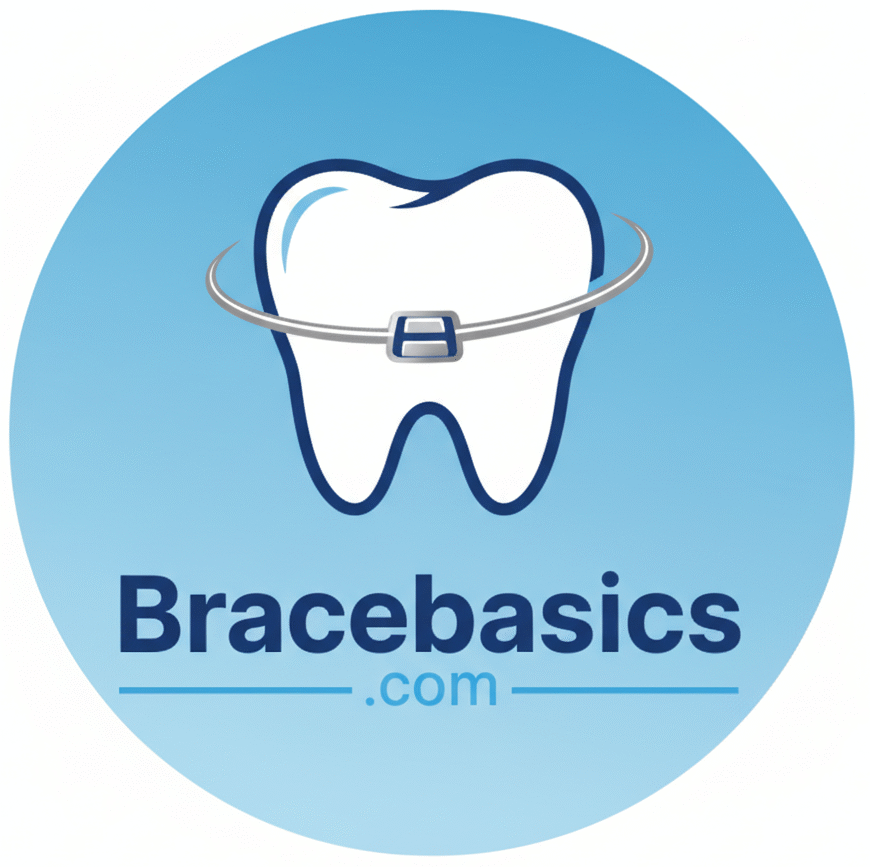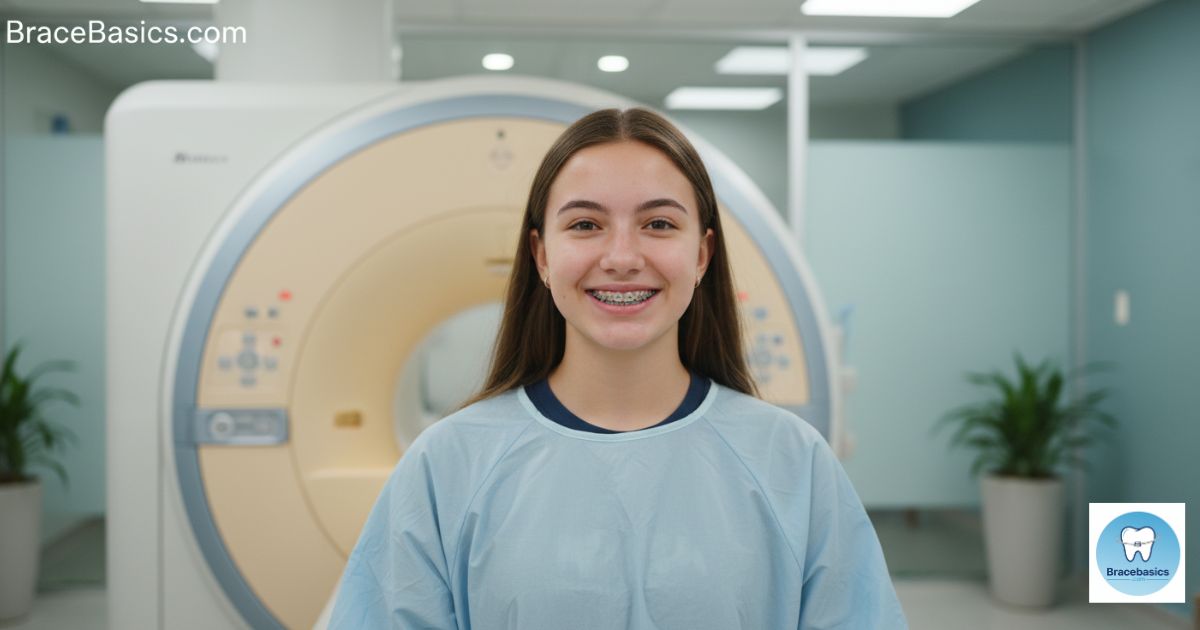Can You Get an MRI With Braces?
Many people feel anxious when they hear they need an MRI scan with braces. The fear usually comes from the idea that braces and magnetic fields might not mix well. After all, an MRI uses strong magnets to create detailed images of the body — so it’s normal to wonder, “Can you get an MRI with braces?”
The good news is that modern orthodontic treatment and MRI technology are usually compatible. Most dental braces MRI safety studies show that scans can be done safely with little to no risk. In this article, we’ll explore how MRI machines work with metal, how braces affect MRI results, and what steps to take to stay safe and get clear images.
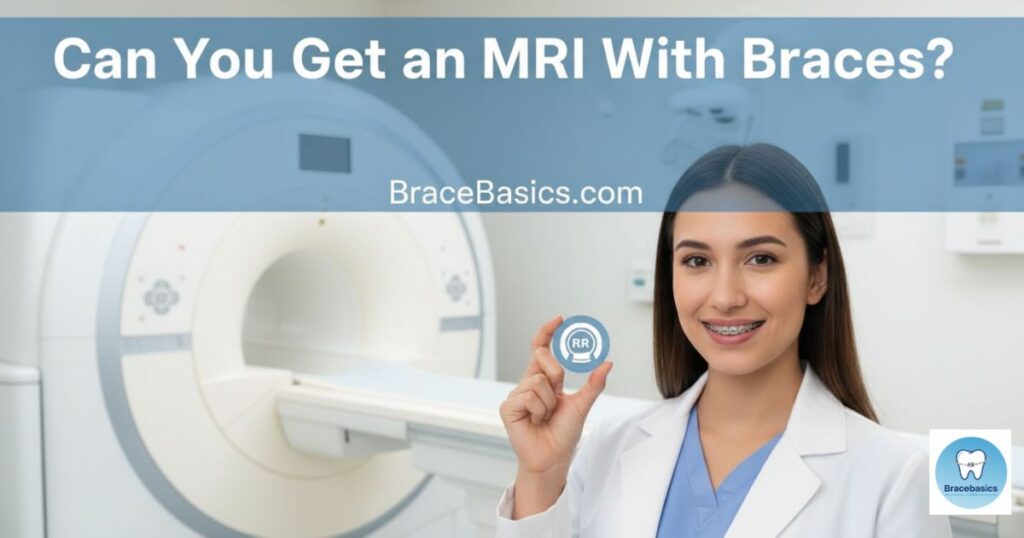
Magnetic Resonance Imaging (MRI) offers powerful, noninvasive images of organs, tissues, and structures inside your body. But if you wear dental braces, you may wonder “can you get an MRI with braces?” Many patients worry that the braces and magnetic field interactions might harm them or distort the images. In fact, modern orthodontic techniques and radiology protocols make MRI scan with braces feasible in most cases. This article dives deep into MRI safety and braces, explains how metal braces and an MRI scan may interfere, and gives you actionable advice for MRI compatibility with braces.
You’ll learn clear answers about how braces affect MRI results, is it safe to get an MRI with braces, braces removal before MRI, MRI image distortion from braces, and much more — all in language that’s easy to grasp.
What Is an MRI and How Does It Work?
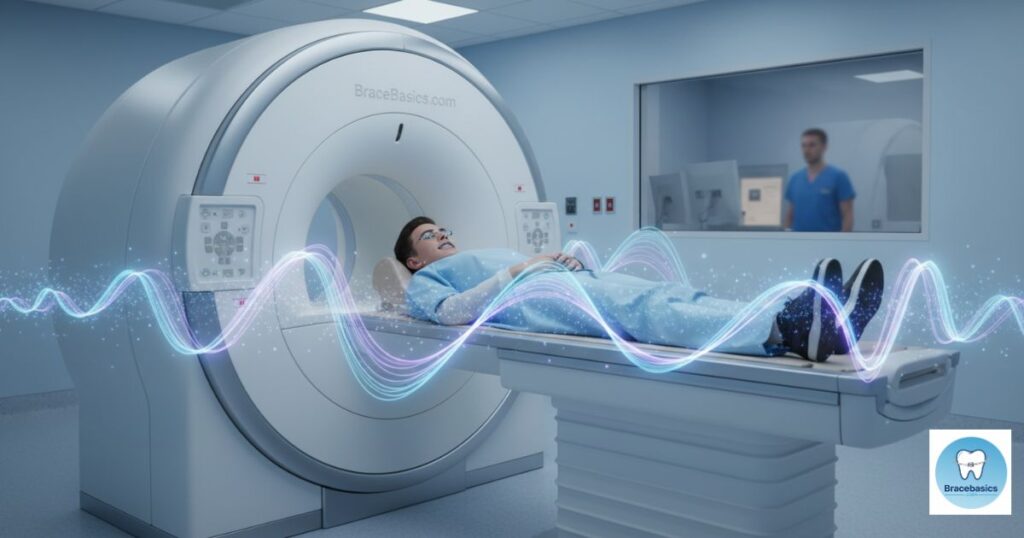
An MRI machine creates images through high-strength magnetic fields and radiofrequency pulses. Hydrogen atoms in your body respond to these fields, and detectors capture the signals to form detailed cross-sectional pictures. The process avoids ionizing radiation (unlike CT scans) and is widely used for brain, spine, joint, and soft tissue exams.
When you hear “what happens during an MRI scan”, know this: you lie still inside a tunnel-like tube, and the machine emits loud knocking sounds. Technicians often give you earplugs and communicate via microphone. The integrity of the magnetic field is key — any disturbance can distort the image.
Because metal can influence magnetic fields, how MRI machines work with metal becomes highly relevant when you have braces or implants. That interplay determines if your MRI will be successful and diagnostic.
Can Braces Affect an MRI Scan?
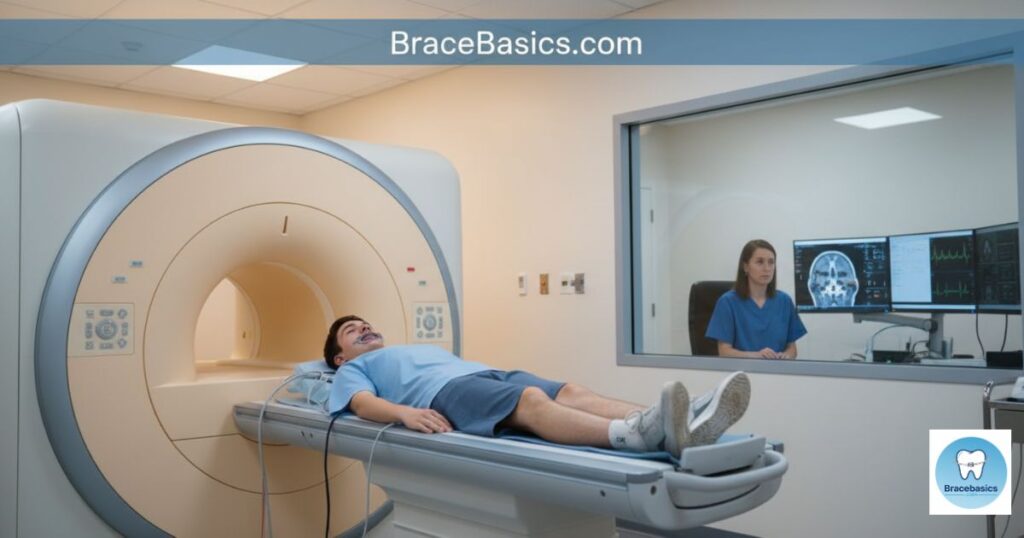
How Metal Braces Interact with MRI Machines
Braces are commonly made from stainless steel, titanium, or ceramic materials. Metals may introduce local magnetic interference or magnetic susceptibility zones that confuse the uniform field the MRI relies on. Not all metals act equally. Titanium and non-metal materials produce much milder interactions.
Research shows that stainless steel brackets and wires are the biggest contributors to interference in magnetic resonance imaging with dental work (PMC9295293). Ceramic brackets, by contrast, tend to cause no significant artifact.
Impact of Braces on MRI Image Quality
When metal in braces disturbs the magnetic field, you get MRI artifacts caused by braces. These appear as dark voids or signal loss zones. In head, face, jaw, or brain MRIs, such artifacts can obscure anatomy or mimic pathology (PMC10043623).
A study showed stainless steel retainers severely impaired diagnostic value, while titanium retainers had lower impact (Springer 2022).
Potential Risks or Safety Concerns
Possible concerns include heating or movement of metal, but evidence shows these risks are minimal. Tests found only a low temperature rise and no detachment under MRI (PMC6926903). Debonding risk is minimal, so routine removal isn’t needed unless the image area overlaps the mouth.
Are Braces Safe for MRI?
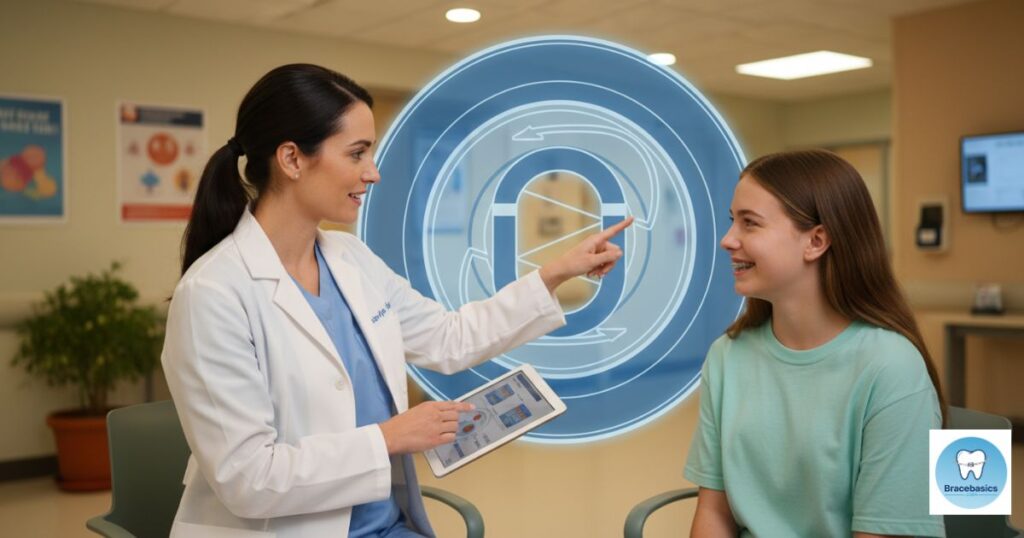
What Experts Say
RadiologyInfo.org states that dental fillings or braces are usually unaffected by MRI’s magnetic field, though they can distort nearby images (RadiologyInfo.org).
A review found that heating and debonding effects are not harmful and artifacts are the main issue (BMC Oral Health 2022).
When Caution Is Needed
If your MRI is of the head, neck, or jaw, artifacts can be problematic. Experts recommend removing stainless steel brackets for head or neck MRIs to avoid image loss (EJO 2015). For scans elsewhere in the body, interference is negligible.
Types of Braces and Their MRI Compatibility
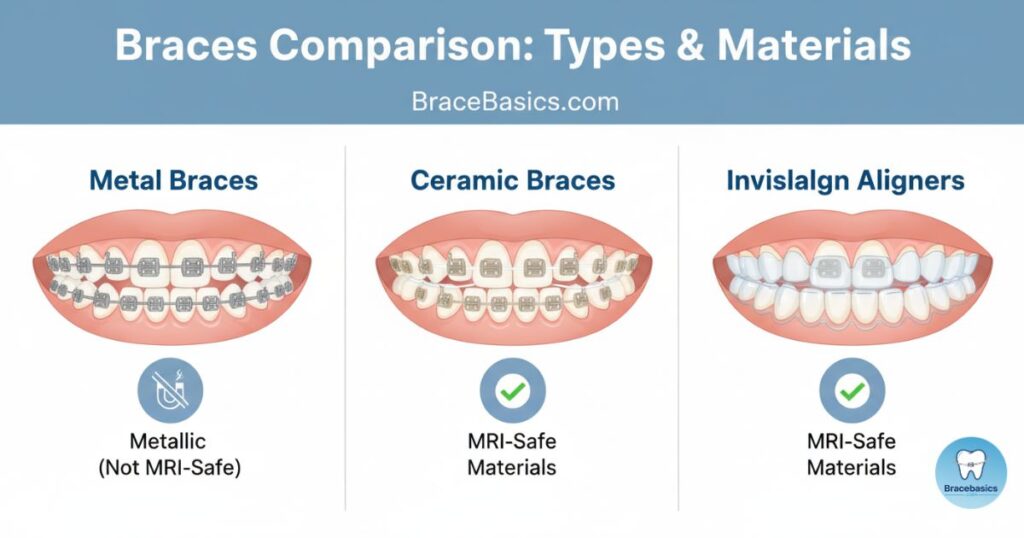
Traditional Metal Braces
Stainless steel braces are strong but cause the most MRI image distortion. Images of sinuses or cervical spine can become unreadable (PMC5606284).
Ceramic Braces
Ceramic braces are MRI-friendly braces. They rarely distort images and are considered safe (PMC9295293).
Invisalign and Clear Aligners
Invisalign MRI compatibility is excellent. Clear aligners are removable, non-metallic, and cause no interference when taken out.
Permanent Retainers and Fillings
Permanent retainers MRI safety depends on material. Stainless steel versions can cause noticeable artifacts, while titanium retainers create mild ones. Most dental fillings and MRI scans are safe since modern fillings are non-magnetic (RadiologyInfo.org).
Preparing for an MRI With Braces

Inform Your Doctor and Radiologist
Always disclose your orthodontic treatment before imaging. It helps the team plan MRI scan preparation with braces and adjust the protocol for MRI dental interference.
Talk to Your Orthodontist
Get your orthodontist’s advice for MRI. They can confirm metal type and whether removal is possible or needed.
Understand Possible Image Distortions
Expect mild distortions during head MRI with braces or jaw MRI and orthodontic metal. Radiologists can minimize this using advanced settings.
Remove Removable Dental Appliances
Remove retainers, aligners, or plates before entering the MRI suite. This prevents metal mouth and MRI scan interference.
Follow Any Special Instructions
Follow technician instructions closely. Some centers use test scans or sequences that correct MRI artifacts caused by braces.
Managing Image Distortions During MRI
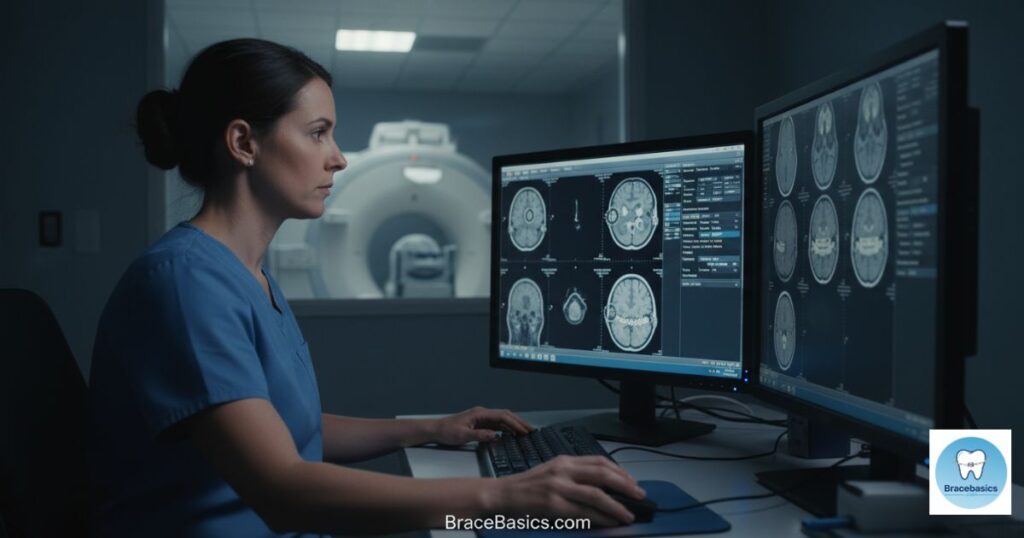
Adjusting Scan Angles or Settings
Radiologists can tilt imaging planes or use artifact-reduction modes to salvage image clarity.
Using Software to Reduce Artifacts
Modern scanners use SEMAC and MAVRIC algorithms to correct metal artifacts (PMC4862114). AI-based correction tools further reduce MRI image distortion from braces (arXiv 2024).
Common Myths About Braces and MRI
Myth 1: Braces Stick to Magnets
False. Orthodontic alloys are not magnetic enough to move or “stick” inside the scanner.
Myth 2: MRI Can Damage Braces
Untrue. MRI’s field can’t break orthodontic bonds. Only artifact risks exist.
Myth 3: MRI Will Heat or Move Braces
Research confirms negligible heating or movement of braces under MRI (PMC6926903).
Dental Work and MRI Scans
Can You Get an MRI With a Permanent Retainer?
Yes, most are safe. Only some stainless steel retainers create heavy distortion in head or neck MRIs (Springer 2022).
Can I Get an MRI if I Have Fillings or Crowns?
Absolutely. Most dental fillings and crowns are made of non-magnetic materials and cause only minimal MRI image artifacts.
Can an MRI Make Your Teeth Hurt?
Rarely, mild tingling or vibration occurs but it’s harmless and passes quickly.
Conclusion
In nearly all cases, you can get an MRI with braces safely. The main challenge is MRI image distortion from braces, not danger.
Communicate with your doctor, remove removable devices, and follow safety protocols. With modern techniques, radiologists can easily manage MRI compatibility with braces and deliver accurate images.
Table: Orthodontic Materials and MRI Impact
| Material / Device | MRI Safety | Artifact Risk | Notes |
| Stainless Steel Braces | Safe with caution | High | Often distorts jaw/head MRIs |
| Titanium Braces | Safe | Low | Minor localized distortion |
| Ceramic Braces | Safe | Very Low | Excellent image quality |
| Invisalign Aligners | Safe | None | Remove before MRI |
| Permanent Retainers (Steel) | Safe | Moderate | May blur oral cavity images |
| Dental Fillings / Crowns | Safe | Very Low | No clinical issues reported |
FAQs
1. Can You Get an MRI With Braces on Your Teeth or Metal in Your Mouth?
Yes, you can get an MRI with braces on your teeth. Modern MRI machines and braces are designed with safety in mind. Most dental braces MRI safety studies show that stainless steel braces MRI or titanium braces MRI don’t pose any real danger. However, the strong magnetic field used during the scan may cause mild MRI image distortion from braces, especially in head or jaw scans.
Technicians usually adjust their settings or scanning angles to reduce MRI dental interference. Always tell your doctor and radiologist about your orthodontic treatment and MRI, so they can plan accordingly. In short, metal braces and MRI scans can coexist safely, but communication with your medical team is essential.
2. Is It Safe to Have a Brain or Head MRI With Braces?
A head MRI with braces is generally safe, though it might cause some MRI artifacts caused by braces — these are blurry spots on the image. The closer the braces are to the scanned area, the more likely minor distortions appear. For example, a jaw MRI and orthodontic metal may blur details around the mouth or sinus region.
Radiologists often use advanced software to reduce these distortions. In most cases, the diagnostic accuracy remains excellent. So, if you’re wondering, “can I do a head MRI with braces?” the answer is yes — it’s safe, though your doctor may recommend additional scans or alternative angles for clearer results.
3. Do I Need to Remove My Braces Before an MRI Scan?
Most patients don’t need to remove braces before an MRI. Modern orthodontic appliances and imaging tests are compatible with MRI scan safety precautions. Only in rare cases — like when doing a brain MRI with old-style metal braces — your orthodontist might temporarily remove the wires to improve image clarity.
If your scan involves the spine, knees, or abdomen, your braces and magnetic field interaction won’t affect results at all. Always inform your doctor before MRI so they can check if your braces removal before MRI is needed or not. Usually, your orthodontist advice for MRI will confirm everything is safe.
4. Will the MRI Machine Pull or Heat the Metal From My Braces?
No, the MRI machine will not pull or heat your braces. This is a common myth. The materials used in today’s orthodontic treatment and MRI — like stainless steel, titanium, and ceramic — are non-magnetic or weakly magnetic. They won’t move or heat up during the scan.
You might hear a loud noise during scanning, but that’s just the machine’s normal operation. There’s no risk of your braces being “pulled” by the magnet. According to radiologist recommendations for braces, the temperature change around dental metals is almost zero, so braces heating during MRI is practically impossible.
5. Can You Still Get Accurate MRI Results While Wearing Braces?
Yes, you can still get accurate MRI results with braces. While metal mouth and MRI scan combinations can cause minor distortions in certain regions, modern imaging software can fix these issues. For areas far from the mouth — like knees, spine, or abdomen — MRI compatibility with braces has no effect at all.
If your scan targets your jaw or head, your doctor might use special filters or angles to reduce MRI image distortion from braces. So, even with dental work or orthodontic appliances, the overall accuracy of your MRI scan with braces remains very high. Just make sure you inform your radiologist and orthodontist before MRI for best results.
Can You Eat Pizza With Braces?
References
- RadiologyInfo.org. MRI Safety. https://www.radiologyinfo.org/en/info/safety-mr
- BMC Oral Health. MRI Compatibility of Orthodontic Brackets and Wires (2022).
- European Journal of Orthodontics. Artifact Distortion in MRI Caused by Orthodontic Appliances (2015).
- PubMed Central (PMC9295293, PMC5606284, PMC6926903, PMC4862114, PMC10043623).
- SpringerLink. Artifact Effects of Fixed Retainers in Head MRI (2022).
- Radiopaedia.org. MRI Susceptibility Artifact Due to Orthodontic Appliance.
- arXiv. Deep Learning-Based Artifact Reduction for MRI Near Metal (2024).
- MRIQuestions.com. Dental and Facial Implants MRI Safety Database.
- Nature.com. MRI Safety in Dental Practice (2018).
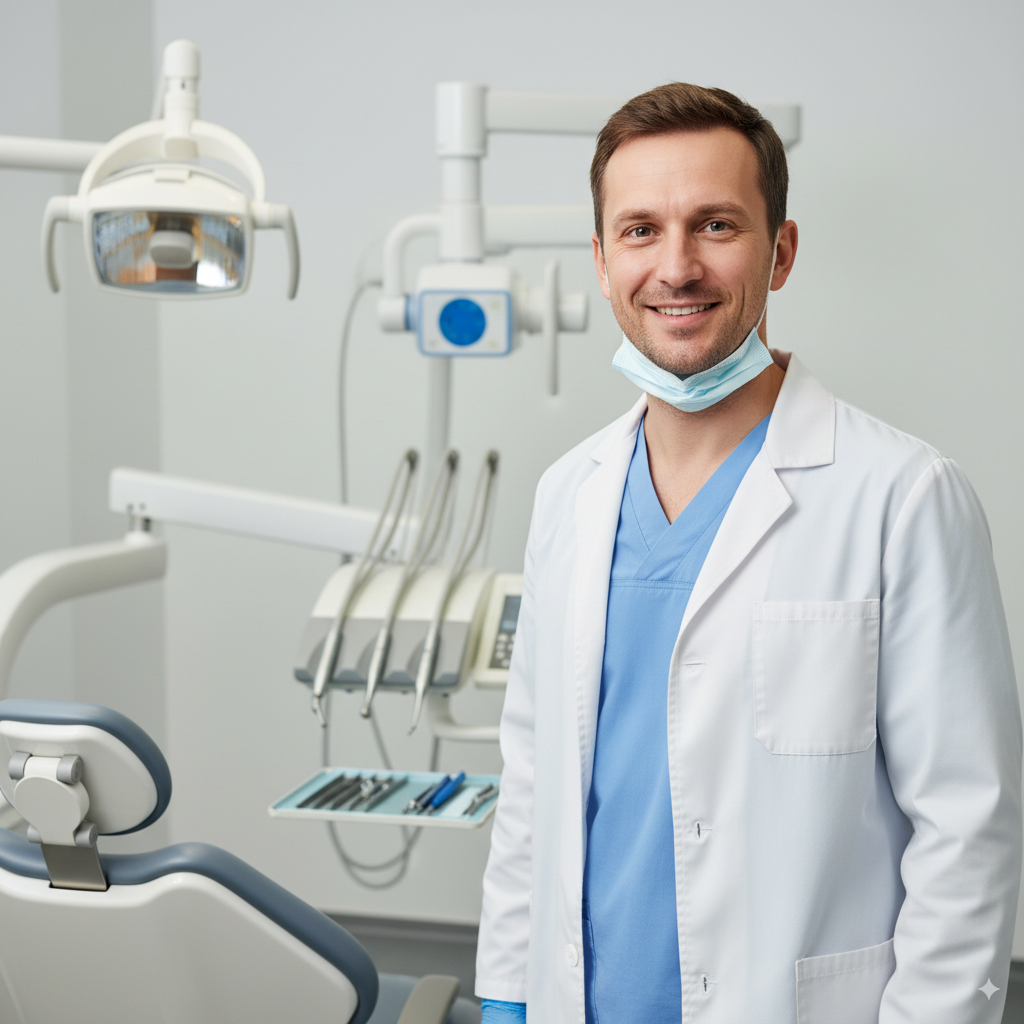
Hi, I’m Dr. Martin, the founder of BracsBasics.com. With years of experience in orthodontics, I’ve made it my mission to simplify braces care for patients of all ages. Here, you’ll find easy-to-understand advice, practical tips, and reliable resources to make your braces journey smoother, healthier, and stress-free. My goal is to help you smile with confidence every step of the way.
